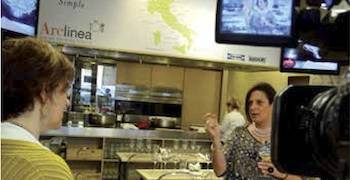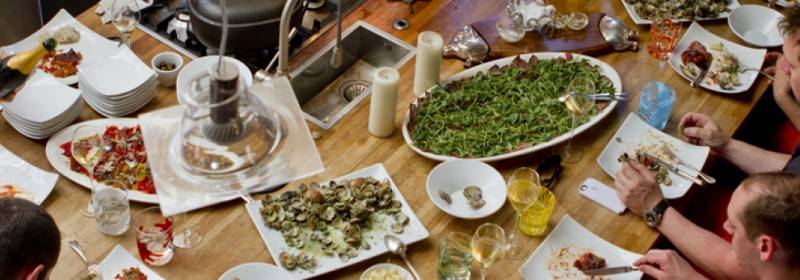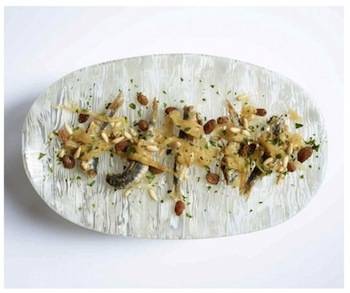The Venetian Cooking Countess
The Financial Times dubbed her the “Cooking Countess.” And indeed, over the years, Enrica Rocca, a quintessentially Venetian and incredibly vivacious woman, has become an important authority on her native land’s cuisine. You understand why as soon as you meet her. Sure, she’s very passionate, but she’s also got a good nose for everything involved in running a family business.
Not only will Enrica tell you her side of Veneto, she’ll serve you food in a unique ambience, teach you how to cook, and, if you’d like, put you up in one of her accommodations in the Venetian countryside. She restored her villa for that express purpose.
Villa il Granaio is located in Mira, on the banks of the Brenta River, only about eight miles from Venice, in an area traditionally frequented by the Venetian elite. It’s a special place where you can also enroll in her world- renowned cooking school or simply relax.
Of course, you might come across the Cooking Countess elsewhere in the world. For years she has taken her cooking around the globe, from Venice to London to Cape Town to the Big Apple.
We recently got the chance to participate in one of her lessons being held at Eataly New York. Her teaching style is very intimate and down to earth, even when dispensing secrets from her experience as an upscale chef. “I don’t teach recipes,” she tells us. “I’d rather teach you how to discover and combine ingredients.”
And with that, she imparts her first important lesson: “Only use in-season ingredients that you can find in the market.”
Change and Tradition
Listening to Erica talk about her brand of cooking is a delicacy in and of itself.
“As our lifestyles have utterly changed (fewer manual jobs, more sedentary lives), Venetian cuisine has to adapt by incorporating lighter dishes with fewer calories. And for many dishes it would be impossible to use the original recipes because the public wouldn’t appreciate it. The flavors are too strong or too bitter (you hear older people often complain that radicchio isn’t as bitter as it was 30 years ago) or too fatty. That is why I try to lighten dishes while still hewing as close as I can to tradition.”
Wise words. But what are the main features of Venetian cooking in Erica’s opinion? “Above all
it is made with products from the region, which vary widely from place to place. We have
the seaside, mountains and plains, meaning we can eat fish, and game from both the mountains and lagoons (duck, pigeon, pheasant). The vegetables are excellent, especially those products in the Venetian lagoon. The dishes themselves are simple, but rich in flavor, especially when you can get away from the tourist centers and venture out into the countryside and around the mountains...”
And then of course there is the Oriental influence—one that dates back to the ancient tradition of the Eastern spice trade, when Venice was one of the first centers of the world. Back to the time of Marco Polo...
“You Must Be Demanding”
We wonder how easy it is to practice her way of cooking in New York. It’s not as though
we can pick up the kinds of ingredients you find among the market stalls of the Rialto... But Enrica assures us “you can do it anywhere, as long as you use the best products possible. You must be demanding.”
Being demanding is sort of the education mission of Enrica, especially abroad. “It’s very fashionable to cook nowadays— it’s all people talk about! The risk is that cooking turns into more of a show than something serious.” Recipes are, in fact, very trendy... “Yes. And to think that recipes are just a commodity of modern times! Our ancestors would make dishes with whatever they could find inside of “zero kilometers” (i.e., in the garden or chicken coop behind their houses). And everything had much more flavor! That’s why I teach my clients to go to the market, buy the freshest stuff there is, and then decide what dishes to make with what we have.”
We often heard Rocca denounce the fact that Italian culinary culture is dying out, especially in the big cities and touristy areas. Is that—like everything else in our culture— becoming more mainstream?
“Unfortunately it is. Personally, Itryto make the public understand that pasta, pizza and lasagna are but a very small part of Italian culture. Every region, every city has its specialties...” Lesson number 2: part of being demanding entails learning how to pick up the different flavors and subtleties of Italian cuisine. That’s not all. Venetians have always known how to host. “I think receiving guests is important in all of Italy,” says Rocca, rather modestly.
“But the Venetians are definitely always happy to open their doors and offer a slice of salami and a glass of wineand share the specialties of their land. Of course, speaking fromexperience, Venice may not be the best example given that there are too many tourists with respect to the size of the city. But in the rest of Veneto you’ll never be disappointed.”
Veneto, Wine’s Dominion
We often talk about its food and tend to forget that the region produces some of the great wines. Any wine suggestions for discovering another side of Veneto?
“First and foremost, Amarone, which is among the top three Italian wines. It is produced in the wine country of Valpolicella, in the province of Verona, east of Lake Garda. The name has an old historic meaning. Val for valley; poli means many in Greek; and cella for cellar. Because in ancient times the area was known as “the valley of many cellars.”
The variety is little known abroad, another casualty of the way cultures and tastes go mainstream, right? “Right. Unfortunately you can only find a few examples of Soave a Valpolicella (and Prosecco) abroad, wines that really represent the potency and variety of this region. But if you happen to be in Veneto, I suggest dedicating a whole day in Valpolicella tasting the really great wines. There are restaurants here that have sensational wine lists.”
A Simple Dish
Rocca recommends one dish that all can make. Super easy. And we recommend bringing
a slice of Venetian cuisine into your house with her latest book, Venice on a plate... But what a plate! (available at Amazon.com)




































i-Italy
Facebook
Google+
This work may not be reproduced, in whole or in part, without prior written permission.
Questo lavoro non può essere riprodotto, in tutto o in parte, senza permesso scritto.